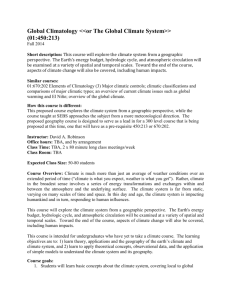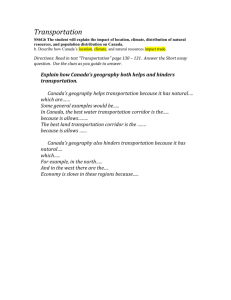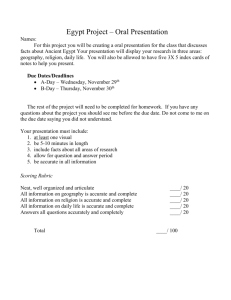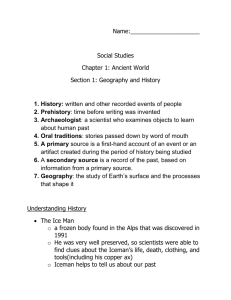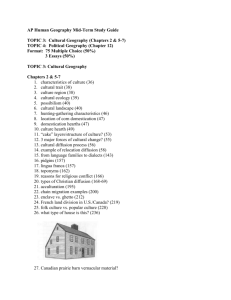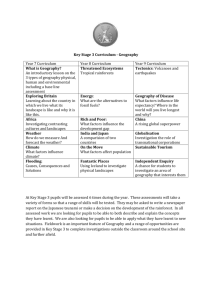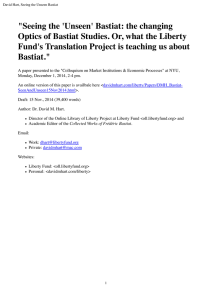Syllabus Economic Growth and Development National Research
advertisement
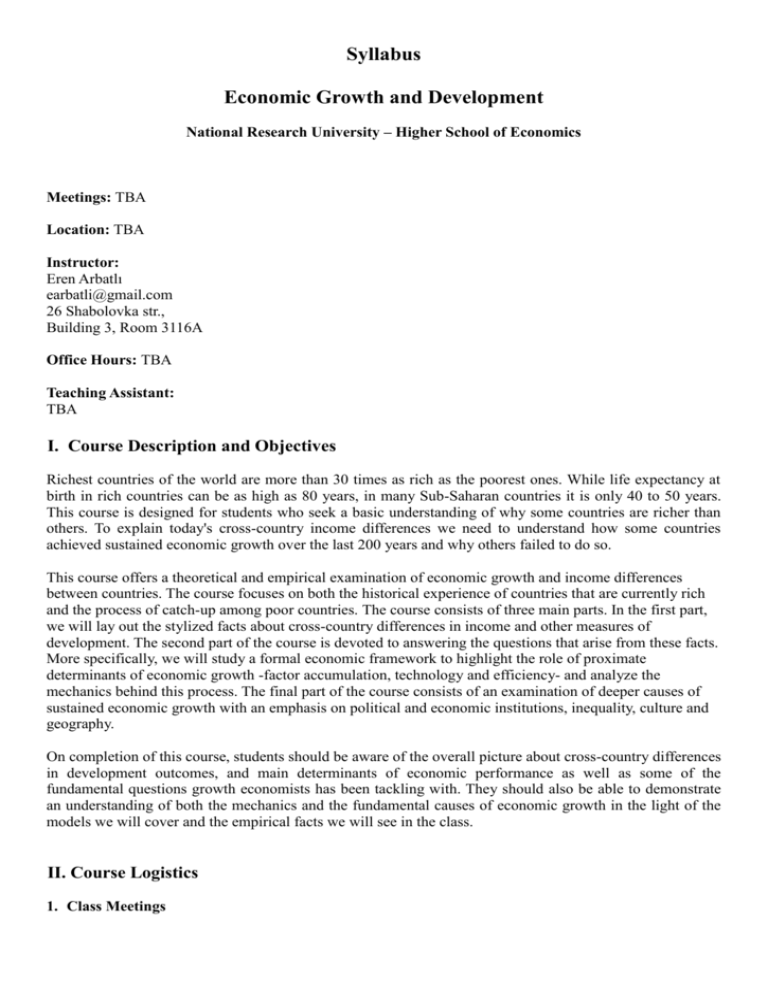
Syllabus Economic Growth and Development National Research University – Higher School of Economics Meetings: TBA Location: TBA Instructor: Eren Arbatlı earbatli@gmail.com 26 Shabolovka str., Building 3, Room 3116A Office Hours: TBA Teaching Assistant: TBA I. Course Description and Objectives Richest countries of the world are more than 30 times as rich as the poorest ones. While life expectancy at birth in rich countries can be as high as 80 years, in many Sub-Saharan countries it is only 40 to 50 years. This course is designed for students who seek a basic understanding of why some countries are richer than others. To explain today's cross-country income differences we need to understand how some countries achieved sustained economic growth over the last 200 years and why others failed to do so. This course offers a theoretical and empirical examination of economic growth and income differences between countries. The course focuses on both the historical experience of countries that are currently rich and the process of catch-up among poor countries. The course consists of three main parts. In the first part, we will lay out the stylized facts about cross-country differences in income and other measures of development. The second part of the course is devoted to answering the questions that arise from these facts. More specifically, we will study a formal economic framework to highlight the role of proximate determinants of economic growth -factor accumulation, technology and efficiency- and analyze the mechanics behind this process. The final part of the course consists of an examination of deeper causes of sustained economic growth with an emphasis on political and economic institutions, inequality, culture and geography. On completion of this course, students should be aware of the overall picture about cross-country differences in development outcomes, and main determinants of economic performance as well as some of the fundamental questions growth economists has been tackling with. They should also be able to demonstrate an understanding of both the mechanics and the fundamental causes of economic growth in the light of the models we will cover and the empirical facts we will see in the class. II. Course Logistics 1. Class Meetings This is a one-module long class that starts on November 9th. The last class is on December 21st. There will be an additional lecture on December 15th 10:30-13:30 to make up for the lecture I was supposed to hold on November 2nd. 2. Class Materials The primary textbook for this course is Economic Growth (second or third edition) by David N. Weil. There is a single copy of the textbook in the library at the main HSE campus on Myasnitskaya st. There is also a website for the textbook, where you can find data, useful links, quizzes, etc: http://wps.aw.com/aw_weil_econgrowth_2/ There will be additional readings (articles, book chapters, etc.) that will be distributed on an ad-hoc basis. III. Performance Evaluation The course grade will be based an end-of-module (final) exam (50%), one response paper (20%) and weekly assignments (30%). Absences from exams will be automatically excused only in cases of medical or family emergency, which must be verified by a letter from the Dean of the Faculty of Economics. Late homework will not be accepted. Late papers will be accepted with a reduction of ten points (out of 100) per day late or fraction thereof. The final exam will be administered within the week following the last class. Exact date of the exam will be announced later. Weekly assignments: The assignments are due 12:00 at noon on Fridays. You can submit your assignment either in hardcopy in class or via e-mail as a Word document (scanned pages are not accepted) to our teaching assistant Rodion (you also need to cc your message to me). I strongly encourage you to submit your homework via e-mail. Please note that no late assignments will be accepted. Each assignment will be graded out of 100 points. Graded hardcopies will be returned in class during the next lecture and graded electronic submissions will be returned via e-mail. Response paper: You will choose one academic article from a candidate list that I will provide and write a response paper to that article (about 3 to 5 pages long with Times New Roman 12 font size). Your response should be in the following overall structure: (i) Briefly summarize the main question the paper tackles with. If you think that this question is important, explain why. If not, discuss why not. (ii) Briefly describe the method the author(s) use to answer the question. Discuss whether this sounds like a reasonable method and why. Mention specific shortcomings and strengths. (iii) Summarize the main findings. What do these findings suggest to you? Are they intuitive or counter-intuitive? Why? (iv) If you had the opportunity, what would you do to improve the paper? When reading a scientific paper, you do not need to understand the econometric techniques or formal mathematical models that are employed in full detail. However, you should consult to online sources to look-up the meanings of technical terms and other economic jargon to get an overall idea about what’s going on in the paper. Please do not plagiarize! This means that you should not present someone else’s findings/comments/ideas as your own. To avoid plagiarism you must (i) clearly cite other work when you refer to it and paraphrase the ideas/statements that are borrowed from other sources even when they do not appear in your paper word-by-word (ii) always include a list of references (similar to that at the end of the articles you respond to). In case, I suspect of plagiarism, I reserve the right to consult to online tools that are available to help identify plagiarism. If such plagiarism is identified, you get no credit from the paper in addition to other academic measures that apply at HSE. Attendance and Class Participation Class participation will be an integral part of the course. Therefore, regular attendance to classes is highly recommended although attendance to lectures by itself will not affect your grade directly. In other words, attending the lecture will not make much of a difference in terms of my informal evaluation of your performance unless you participate in the lecture as an active listener and discussant. Such active participation will help you learn the material and will make the class more interesting and enjoyable for you and your class mates. It also serves the goal of making the material personally relevant to you. Those of you who are reluctant to speak in class should to try to do so because participation of this kind is a useful and important skill. IV. Tentative Course Schedule Date Lecture Topics Deadlines 9/11 Introduction Facts to be Explained (Ch.1) Assignment #1 A framework for analysis Physical Capital Assignment #2 -Assignment #1 16/11 Population and Economic Growth Future Population Trends Human Capital Assignment #3 -Assignment #2 23/11 Measuring Productivity The Cutting Edge of Technology The Role of Technology in Growth Assignment #4 -Assignment #3 30/11 Efficiency Government and Institutions Assignment #5 - Assignment #4 - Deadline for submitting your paper topic. 14/12 Income Inequality Growth in the Open Economy - Assignment #5 15/12 Culture Geography, Climate and Natural Resources Assignment #6 21/12 Resources and the Environment at the Global Level -Assignment #6 -Deadline for submitting Some tentative conclusions your short paper TBA End-of Module Final Exam 7/12 V. Suggested readings for the interested The Role of Geography/Government Jared Diamond, 1999. Guns, Germs, and Steel: The Fates of Human Societies. Description: An exploration of the role of geography in shaping long-run economic development. E. L. Jones, 2003. The European miracle : environments, economies, and geopolitics in the history of Europe and Asia. Description: An investigation into why Europe developed before the rest of the world, focusing on the interaction of geography and government. Nunn, Nathan. (2007). Ruggedness: The Blessing of Bad Geography in Africa, Mimeo, March, 2007. More comprehensive resources: David S. Landes,1998. The wealth and poverty of nations : why some are so rich and some so poor? Description: An economic history of the last five centuries, emphasizing the roles of culture, geography, politics, and technology in contributing to regions' differing economic outcomes. William Easterly, 2002. The Elusive Quest For Growth, Economists' Adventures And Misadventures In The Tropics. Description: A history and critique of economic development policy as practiced by the World Bank and other international organizations. Population Massimo Livi-Bacci, 1997. A concise history of world population. Description: A history of fertility, mortality, and the factors which influenced them. Free Trade and Globalization Douglas Irwin, 2009. Free trade under fire. Description: A spirited defense of free trade. Ha-Joon Chang, 2007. Bad Samaritans: The Myth of Free Trade and the Secret History of Capitalism (Ch. 1-4, 8-9). Description: An alternative view on economic globalization by one of the most effective advocates of antiglobalization. “Chang illustrates a vast array of contradictions and hypocrisies spouted by the neoliberal agenda (sometimes known as neo-conservative in the U.S.) to completely deregulate developing governments” (From Publisher's Weekly). Frederic Bastiat, The Candlemakers' Petition: An economic fable. (available on the Internet) Description: A fable by 19th century French economist Frederic Bastiat on free trade and anti-free trade policies. Role of Technology Joel Mokyr, 1990. The Lever Of Riches: Technological Creativity And Economic Progress. Description: A narrative history of technological progress as well as an analysis of the economic forces that drive it. Health/Human Capital William Hardy McNeill, 1998, Plagues and peoples Description: An examination of the role that disease has played in human history. Acemoglu, Daron, and Simon Johnson. (2007). Disease and Development: The Effect of Life Expectancy on Economic Growth, Journal of Political Economy, 115: 925-985. General Views/Essays John Maynard Keynes, 1930. Economic Possibilities for our Grandchildren. (available on the Internet). Description: An essay written by British economist J.M. Keynes during the Great Depression. offering his views on the possible level of our economic lives in hundred years from now. Environment, Natural Resources and Good Life Lester M. Milbrath, 1993. Redefining the Good Life in a Sustainable Society, Environmental Values, Volume 2, Number 3, August 1993 , pp. 261-269(9). Abstract: The good life, as practised in modern society, not only is unsustainable but also is frequently not really good. Quality in living is necessarily subjective, it cannot be defined in physical terms, and can be found in many manifestations. The search for quality is conducted within ourselves and not in a shopping mall. Several suggestions for modes of living that provide quality but do not burden or injure ecosystems are presented. The condition of life systems on our planet demand that we cultivate simple lifestyles that are inwardly rich. Mark Sagoff, Do We Consume Too Much? The Atlantic Online web link: http://www.theatlantic.com/past/issues/97jun/consume.htm Description: This article discusses the misconceptions about natural resources and environmental sustainability. The Role of Institutions Mancur Olson, Jr., 1996. Distinguished Lecture on Economics in Government: Big Bills Left on the Sidewalk: Why Some Nations are Rich, and Others Poor, The Journal of Economic Perspectives, Vol. 10, No. 2, 3-24. Description: A lecture on the crucial role played by institutions and policies in the quest of economic development. Acemoglu, Daron, Simon Johnson, and James Robinson. (2001). Colonial Origins of Comparative Development: An Empirical Investigation, American Economic Review, 91 (5), 1369-1401. Fisman, Raymond and Edward Miguel. (2008). Corruption, Norms, and Legal Enforcement: Evidence from Diplomatic Parking Tickets, Journal of Political Economy, forthcoming. Foreign aid/charity, sweatshops, moral aspects of development Peter Singer, 1972. Famine , Affluence, and Morality, Vol. 1., No. 3, 229-243. Description: “This essay argues that affluent persons are morally obligated to donate far more resources to humanitarian causes than is considered normal in Western cultures.” (Wikipedia) Matt Zwolinski, 2007. Sweatshops, Choice, and Exploitation, Business Ethics Quarterly, Vol. 17, No. 4, pp. 689-727. Description: The author offers “a moral claim against interference in the conditions of sweatshop labor by third parties such as governments or consumer boycott groups”.

